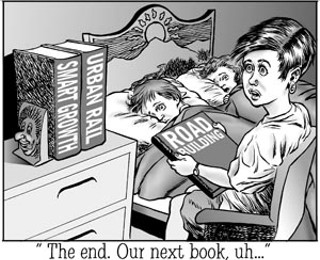Top 10 Local Stories
Central Texas in 2005
Fri., Jan. 7, 2005

Or most of them, anyway. See the lists that follow for election highlights, media matters, and the police roundup.
1) For Whom the Road Tolls: They heard the state say all new highways have to be toll roads, so Central Texas obliged, provoking a firestorm that's lasted for much of 2004. At year's end, local leaders were poised to roll back some of the most controversial elements of the regional toll road plan, but not until the political damage had been done. A recall effort against three City Council members continues, the Lege has toll road reform on its (long) to-do list, and the state's highway strategy promises to be an issue in the 2006 governor's race.
2) The Train Finally Stops Here: After 19 years, Capital Metro finally has enough political capital to do what it was, in large part, created to do – build a rail-transit system serving the Austin metro area. While the plan approved resoundingly by voters in November struck many supporters as too tame, the A-Train at least opens the door for a Central Texas transportation system not entirely dependent on the automobile.
3) Hospital-izations: Local voters also finally approved creation of a Travis Co. hospital district – only to uncork a battle between the courthouse and City Hall over funding the new entity. Amid charges of city larceny and county ingratitude, the new district board had the thankless task of getting the thing up and running – a project still in progress – amid obvious signs that the local health care system is close to collapse.
4) Mueller's Perfect Landing: After 20 years of talk and eight years of action, the city and Catellus Austin consummated the largest real-estate deal in Austin history, the $1.3 billion redevelopment of the city's shuttered municipal airport. Among the players – speaking of hospitals – is Seton Healthcare Network, which basically got Children's Hospital as a gift from the city, but then repaid the favor with plans for a bigger, better facility anchoring the Mueller project.
5) Westward Ho!: The environmental wars shifted to the lawless hinterlands of western Travis Co., where new subdivisions are coming out of the ground faster than you can say "preliminary plat." The West Cypress Hills subdivision hammered pristine Lick Creek, and Little Barton Creek took a beating from the Shops at the Galleria project in Bee Cave. Much more is planned for out in the county, where regulatory oversight is virtually nonexistent. Aiding and abetting these endeavors is the Lower Colorado River Authority, an agency that's never rejected an invitation to extend water service to even the most environmentally sensitive areas.
6) Everyday Low/Lowe's Prices: As was the case in 2003, the term "big box" conjures two different but interrelated stories. One is a skirmish in the enviro wars, with star billing for Lowe's Home Centers, which spent all year fighting over its building projects in Sunset Valley and Bee Cave. The other is an economic story, with City Hall mangling its attempt to quantify the true cost to Austin of Wal-Mart and its ilk, and community advocates and independent businesses later coming in to sort out the pieces.
7) When the Music's Over: Turn out the lights for the Austin Music Network, everybody's favorite symbol of what they don't like (whatever that may be) about City Hall. After eight years and more than $5 million, the star-crossed network finally gave up the ghost – at least in its city-sponsored form – in September, as City Hall cut a deal with a private-sector partnership to reinvent Channel 15 as a for-profit music and arts channel.
8) As the BUNZ Crumble: Former hometown-biz star Schlotzsky's Inc. was turned upside down midyear with the dumping of CEO John Wooley and his VP brother, Jeff. With former airline executive Sam Coats taking the helm, the struggling deli chain bumped through bankruptcy court on its way to the auction block, where Odessa oilman Bobby Cox picked up its assets for $28.5 million – a fraction of Schlotzsky's value during the Nineties. Assuming all goes according to plan, Schlotzsky's will start the New Year as a privately owned company. Shareholders, alas, were left with nothing but the crumbs.
9) The Downtown Dominoes: One big piece of the city's long-cherished plans for reinventing Downtown – the new Austin City Hall – opened its doors in November. After high-profile invitations to private-sector dance partners, two more dominoes – the adjoining Block 21 and the old Seaholm Power Plant – are poised to fall soon. Combined with lots of new private projects, the dreams and fantasies of decades are actually turning into concrete.
10) The New West Campus: The Central Austin Combined Neighborhood Plan represented a watershed for the city's deliberate journey toward citizen-driven Smart Growth, mostly because of its University Neighborhood Overlay – a grand bargain wherein Birkenstock Belt neighbors traded massive increases in West Campus density for the right to keep their single-family neighborhoods stable. The UNO reverses decades of slow- and no-growth approaches to the UT area, offering the promise that students can once again actually live in a real campus neighborhood.
Got something to say on the subject? Send a letter to the editor.






